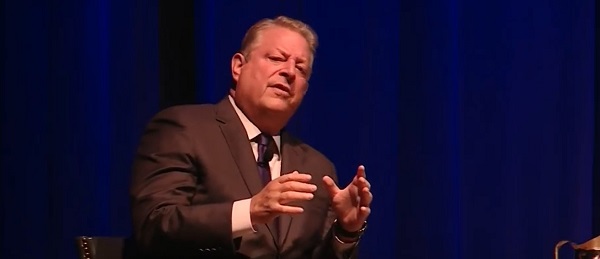Inflation
Trudeau’s carbon tax rebrand lipstick on a pig

From the Canadian Taxpayers Federation
Author: Franco Terrazzano
the Liberals are now calling it the ‘Canada Carbon Rebate.’
The Canadian Taxpayers Federation is criticizing the federal government for rebranding its carbon tax rebate instead of providing relief by scrapping the tax altogether.
“Prime Minister Justin Trudeau’s carbon tax rebrand is just lipstick on a pig,” said Franco Terrazzano, CTF Federal Director. “Canadians need tax relief, not a snappy new slogan that won’t do anything to make life more affordable.”
“The federal government is rebranding the carbon tax rebate,” reported CTV News today. “Previously known as the Climate Action Incentive Payment, the Liberals are now calling it the ‘Canada Carbon Rebate.’
“The change does not come with any adjustments to how the federal fuel charge system and corresponding refund actually works.”
The carbon tax will cost the average family up to $710 this year even after the rebates, according to the Parliamentary Budget Officer.
The federal government is increasing the carbon tax again on April 1. After the hike, the carbon tax will cost 17 cents per litre of gasoline, 21 cents per litre of diesel and 15 cents per cubic metre of natural gas.
“Trudeau’s real problem isn’t that Canadians don’t know what his government is doing, Trudeau’s real problem is that Canadians know his carbon tax is making life more expensive,” Terrazzano said. “Instead of a rebrand, Trudeau should scrap the carbon tax to provide real relief.”
Business
Al Gore Attempts To Keep The Sinking Climate Crisis Ship Afloat


From the Daily Caller News Foundation
By David Blackmon
“When something is unsustainable, it eventually stops,” former Vice President Al Gore said in an op/ed published by The Wall Street Journal. Given recent events, one might think Gore was referring to the ruinously costly attempts by governments of the Western world to force an energy transition via trillions of debt-funded dollars in subsidies for unreliable, intermittent energy sources like wind, solar and green hydrogen.
It has become obvious to most in the energy business now that the stick-and-carrot approach to a forced transition implemented by the Biden administration is not just unsustainable but a colossal failure. The stick of heavy-handed regulations and mandates combined with the carrot of economically ruinous government subsidies has resulted in a massive uptick in the national debt along with a playing field littered with dozens of bankruptcies by both startups and pre-existing green energy companies alike. Collectively, their waste of federal dollars makes the Obama-era Solyndra failure look like pocket change.
As critics of the Biden Green New Deal suite of policy choices repeatedly warned, the rent-seeking industries that became the chosen clients of the Democratic Party over the last four years – wind, solar, electric vehicles and green hydrogen – cannot displace fossil fuels in any scalable sense because the laws of physics don’t allow it. Too many companies in these industries also cannot be sustained for more than short periods of time without constant new injections of additional government subsidies, all of which in the U.S. have the impact of increasing the national debt.
When the Orwellian-named Inflation Reduction Act passed on party line votes in congress in 2022, I and others warned that the Democrats in congress and the Biden White House viewed the bill as just an initial down payment on their long-term goals. A steady succession of new IRA-type debt-funded bills would be required in the coming decades to sustain the transition, and without those added tranches of trillions of dollars in additional subsidies, most startups in those non-competitive energy businesses would ultimately fail. It wasn’t hard to see this coming.
In his op/ed, Gore writes all this financial carnage off with his typical climate alarm fearmongering, saying things like “treating the transition to a sustainable economy as optional isn’t an option,” and “the cost of inaction is indefensible and unbearable.” To which the only proper response is to ask Gore to tell that to all the lower income Americans who have seen their utility bills and food prices inflate to unbearable levels as they have borne the brunt of the inevitable outcome of the policies Gore, Biden and their cronies have happily forced onto the public. It’s one of the greatest transfers of wealth from the poor to the wealthy in global history. If you want an example of unsustainability, there it is.
Most hilariously, Gore states that “in the U.S., the fossil-fuel industry, its allies and captive policymakers seek to punish companies and investors pursuing sustainability goals with frivolous lawsuits, smear campaigns and the withdrawal of state-controlled funds under management.” Holy smokes, talk about a prime example of Clintonian projection, there it is.
No industry has been subjected to a decades-long constant stream of frivolous lawsuits and smear campaigns from critics quite like the coal and oil and gas industries have sustained in modern times. Right now, today, the oil industry is spending hundreds of millions of dollars defending itself against a well-organized lawfare campaign in which left-wing law firms recruit friendly, mostly-Democrat officials in cities, counties and states around the country to file frivolous lawsuits claiming billions of dollars in unsubstantiated damages related to climate change theoretically caused by emissions coming mainly from China. That is the very definition of a frivolous smear campaign and lawfare campaign rolled into one.
But it is Gore’s complaint about the effort by the Trump administration to implement a “withdrawal of state-controlled funds under management” that really takes the cake here. Apparently, this former vice president believes that elections really don’t matter at all.
But elections do matter, policies can change and billions of dollars in funds awarded to political cronies of one president can indeed be clawed back by another. Gore can rage against these winds of change all he likes, but that is American democracy in action.
David Blackmon is an energy writer and consultant based in Texas. He spent 40 years in the oil and gas business, where he specialized in public policy and communications.
Bjorn Lomborg
We need to get smart about climate

From the Fraser Institute
APPEARED IN THE FINANCIAL POST
By: Bjørn Lomborg
Canada’s chattering classes claim that climate change is one of the country’s pre-eminent threats. This is extraordinary. Canada is experiencing a productivity slowdown, the worst decline in living standards in 40 years, and growth rates that lag most developed economies. Geopolitical threats loom, the healthcare system is under stress and education is faltering. Yet the federal government has spent or committed more than $160 billion on climate initiatives since 2015, and is funneling $5.3 billion to help poor countries respond to climate change.
Like most nations, Canada faces tough decisions in coming decades. Resources spent on climate will not be not available for health, education, security or boosting prosperity.
Global warming is a real problem. Science has shown quite clearly that more CO₂, mostly from fossil fuel use, increases global temperatures. Climate economics has shown how this brings both problems and benefits (for instance, more deaths caused by heat, fewer by cold) but, overall, more problems than benefits. More CO₂ means higher social costs, so reducing CO₂ does have real benefits.
But climate policies also have costs. They force families and businesses to use more expensive energy, which slows economic growth. You might have heard otherwise but if the new ways really were cheaper, no regulations or mandates would be needed.
If climate change were treated like any other political issue, we would openly recognize these trade-offs and try to balance them to get the most climate benefits for the least cost, recognizing that climate policies need to compete against many other worthy policies.
But in two important ways the climate conversation has gone off the rails.
First, people say — wrongly — that global warming is an existential challenge, risking the end of mankind. Of course, if the world is about to end, it follows that any spending is justified. After all, if a world-obliterating meteor is hurtling towards us, we don’t ask about the costs of avoiding it.
Second, it is also often claimed — somewhat contradictorily — that the green transition will make energy cheaper, societies safer and everyone richer. In this “rainbows and unicorns” scenario, there are no trade-offs and we can afford climate policy and everything else.
Both claims are repeated ad nauseam by Canadian politicians and activists and spread by media hooked on selling climate catastrophes and green utopias. But both are quite untrue.
That is why I’m writing this series. I will outline how many of the most sensationalist, scary climate stories are misleading or wrong and ignore the best climate science. Being data-driven, I will show you this with the best peer-reviewed data and numbers.

So: Is climate change the world’s all-encompassing problem today? One way to test this is to look at extreme weather, which we constantly hear is having an ever-larger impact on our societies. But the data paint a very different picture (see chart).
We have good evidence for the number of people killed in climate-related disasters, i.e., floods, storms, droughts, and fires. (We’ll look at temperature deaths next week.) A century ago, such disasters routinely killed hundreds of thousands, even millions of people in a single disaster. On average, about half a million people a year died in such disasters. Since then, the death toll has declined precipitously. The last decade saw an average of fewer than 10,000 deaths per year, a decline of more than 97 per cent.
Of course, over the past century the world’s population has quadrupled, which means the risk per person has dropped even more, and is now down by more than 99 per cent. Why this great success story? Because richer, more resilient societies with better technology and forecasting are much better able to protect their citizens. That doesn’t mean there is no climate signal at all, but rather that technology and adaptation entirely swamp its impact.
In the same way, climate’s impact on overall human welfare is also quite small. In proportion to the total economy, the cost of climate-related disasters has been declining since 1990. Looking to the future, the best estimates of the total economic impact of climate change come from two major meta-studies by two of the most respected climate economists. Each shows that end-of-century GDP, instead of being 350 per cent higher, will only be 335 per cent higher.
“Only” becoming 335 per cent richer is a problem, to be sure, but not an existential threat. Despite that, as this series will show, many of the most draconian climate policy proposals so casually tossed around these days will do little to fix climate but could dramatically lower future growth and the opportunities of future generations.
We need to get smart on climate. This series will map out how.
-

 2025 Federal Election2 days ago
2025 Federal Election2 days agoJoe Tay Says He Contacted RCMP for Protection, Demands Carney Fire MP Over “Bounty” Remark
-

 2025 Federal Election2 days ago
2025 Federal Election2 days agoHong Kong-Canadian Groups Demand PM Carney Drop Liberal Candidate Over “Bounty” Remark Supporting CCP Repression
-

 2025 Federal Election2 days ago
2025 Federal Election2 days agoPoilievre To Create ‘Canada First’ National Energy Corridor
-

 2025 Federal Election2 days ago
2025 Federal Election2 days agoAlcohol tax and MP pay hike tomorrow (April 1)
-

 2025 Federal Election2 days ago
2025 Federal Election2 days agoChina Election Interference – Parties Received Security Briefing Days Ago as SITE Monitors Threats to Conservative Candidate Joe Tay
-

 2025 Federal Election2 days ago
2025 Federal Election2 days agoFixing Canada’s immigration system should be next government’s top priority
-

 2025 Federal Election1 day ago
2025 Federal Election1 day agoPoilievre, Conservatives receive election endorsement from large Canadian trade union
-

 Bruce Dowbiggin2 days ago
Bruce Dowbiggin2 days agoAre the Jays Signing Or Declining? Only Vladdy & Bo Know For Sure






